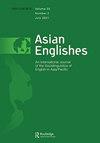Re-positioning accent attitude in the Global Englishes paradigm: a critical phenomenological case study in the Chinese context
IF 1.8
Q1 LINGUISTICS
引用次数: 0
Abstract
English varieties have long been researched in the field of sociolinguistics. In recent decades, globalisation has motivated researchers to focus more on Global Englishes (GE) (Rose & Galloway, 2019). GE is an inclusive paradigm that focuses on the diversity and fluidity of English use and English users against the backdrop of globalisation (Rose & Galloway, 2019). The number of English learners in China has reached approximately 400 million (Wei & Su, 2015), which plays a critical part in the globalised use of English. As a result, Dr Fan Fang adopts the GE paradigm to explore the Chinese context from a critical phenomenological perspective, which is a reflective way to revisit accent attitude to break rigid monolithic views of ‘English’. The opening chapter of this book first describes the current situation of English language teaching, the mainstream of which conforms to ‘native speaker’ varieties and fixed standards. Most English learners are not aware of the diversity and fluidity of English as a global language. Therefore, such a dilemma calls for transformation in English language teaching to fulfil the various purposes of English learners, such as achieving good intercultural communication and improving one’s economic future. The book then proceeds to GE theory and distinguishes GE from some parallel concepts like World Englishes (WE), English as a lingua franca (ELF) and translanguaging. The concept of ELF is in essence similar to English as an international language. ELF emphasises the communicative effectiveness among people of different mother tongues rather than a particular English variety with codifiable linguistic features. However, some scholars criticise it for neglecting the multiplicity of English (Phillipson, 2008). The WE paradigm is also criticised for its ignorance of the differences among English users within each concentric circle, given that all English varieties are categorised into three concentric circles based on the nations (Jenkins, 2006; Kachru, 1992). Rose and Galloway (2019) claim that GE is an umbrella term, a more inclusive one that can integrate the aforementioned concepts to avoid limiting GE research to specific models, regions or English user groups. This term has the features of continuity and integration, bringing the theory of global use of English into a new phase. In Chapter 2, different language ideologies relevant to English are discussed, since these language ideologies influence people’s attitudes towards the English language and their identity construction. An overview of language ideologies in relation to the diversified use of English is provided, including standard English, WE, ELF and translanguaging theory. The author is sympathetic to the sociocultural and sociolinguistic aspects of language, which is of great importance to understand various language ideologies. In Chapter 3, the author concentrates on the Chinese context. From reviewing English language use in China, the chapter moves on to the ‘China English’ (CE)全球英语范式中重音态度的重新定位——一个中国语境下的批判性现象学个案研究
长期以来,社会语言学界一直在研究英语变体。近几十年来,全球化促使研究人员更多地关注全球英语(GE)(Rose&Galloway,2019)。通用电气是一个包容性的范式,专注于全球化背景下英语使用和英语用户的多样性和流动性(Rose&Galloway,2019)。中国的英语学习者人数已达到约4亿(Wei&Su,2015),这在英语的全球化使用中起着至关重要的作用。因此,范芳博士采用GE范式,从批判性现象学的角度来探索汉语语境,这是一种反思口音态度的方式,以打破僵化的“英语”单一观点。本书的第一章首先描述了英语教学的现状,英语教学的主流符合“母语者”的多样性和固定的标准。大多数英语学习者没有意识到英语作为一种全球性语言的多样性和流动性。因此,这种困境要求英语教学进行变革,以实现英语学习者的各种目的,如实现良好的跨文化交际和改善个人的经济前景。然后,本书继续探讨通用电气理论,并将通用电气与一些平行的概念区分开来,如世界英语(WE)、英语通用语(ELF)和跨语言。ELF的概念本质上类似于英语作为一种国际语言。ELF强调不同母语的人之间的交际效率,而不是具有可编纂语言特征的特定英语变体。然而,一些学者批评它忽视了英语的多样性(Phillipson,2008)。WE范式也因忽视每个同心圆内英语使用者之间的差异而受到批评,因为所有英语变体都根据国家划分为三个同心圆(Jenkins,2006;Kachru,1992)。Rose和Galloway(2019)声称,通用电气是一个总括性术语,一个更具包容性的术语,可以整合上述概念,以避免将通用电气的研究局限于特定的模型、地区或英语用户群体。这一术语具有连续性和整体性的特点,使英语全球使用理论进入了一个新的阶段。在第二章中,我们讨论了与英语相关的不同语言意识形态,因为这些语言意识形态影响着人们对英语的态度和他们的身份建构。概述了与英语多样化使用有关的语言意识形态,包括标准英语、WE、ELF和跨语言理论。作者同情语言的社会文化和社会语言学方面,这对理解各种语言意识形态具有重要意义。在第三章中,作者着重研究了汉语语境。本章从回顾英语在中国的使用入手,进入“中国英语”(CE)
本文章由计算机程序翻译,如有差异,请以英文原文为准。
求助全文
约1分钟内获得全文
求助全文
来源期刊

Asian Englishes
LINGUISTICS-
CiteScore
3.30
自引率
18.80%
发文量
34
期刊介绍:
Asian Englishes seeks to publish the best papers dealing with various issues involved in the diffusion of English and its diversification in Asia and the Pacific. It aims to promote better understanding of the nature of English and the role which it plays in the linguistic repertoire of those who live and work in Asia, both intra- and internationally, and in spoken and written form. The journal particularly highlights such themes as: 1.Varieties of English in Asia – Including their divergence & convergence (phonetics, phonology, prosody, vocabulary, syntax, semantics, pragmatics, discourse, rhetoric) 2.ELT and English proficiency testing vis-a-vis English variation and international use of English 3.English as a language of international and intercultural communication in Asia 4.English-language journalism, literature, and other media 5.Social roles and functions of English in Asian countries 6.Multicultural English and mutual intelligibility 7.Language policy and language planning 8.Impact of English on other Asian languages 9.English-knowing bi- and multilingualism 10.English-medium education 11.Relevance of new paradigms, such as English as a Lingua Franca, to Asian contexts. 12.The depth of penetration, use in various domains, and future direction of English in (the development of) Asian Societies.
 求助内容:
求助内容: 应助结果提醒方式:
应助结果提醒方式:


